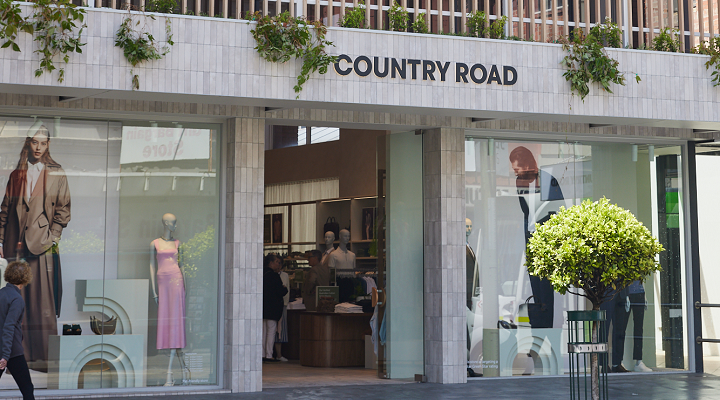Australian retailers are expanding their horizons after the Covid pandemic and actively assessing opportunities overseas. Despite some unsuccessful forays beyond the borders of Australia and New Zealand by some retailers, there is increasing optimism about global expansion. Enhanced market analysis and management tools generated by new technology and the attraction of international customers from online platforms are no doubt key factors. However, another driver has been the imperative to respon
pond to the erosion of market share by international retail brands that have entered the Australian market.
Venturing into new overseas markets potentially spreads the risk of trading downturns, but, more significantly, it can offer stronger growth prospects than the mature and highly competitive Australian retail market.
However, there tends to be a risk-averse culture in business. This is evident with seven out of 10 of the top companies on the Australian Securities Exchange mostly focused on the Australasian region. That includes Coles and Woolworths, which are both ranked in the top 20 global retailers, but have shown limited interest in expanding further than the land of the kiwis.
Hit and miss
There have, of course, been some notable and successful forays into overseas markets by Harvey Norman, Cotton On Group and Australian franchise systems, such as Dominos Pizza Enterprises, Retail Food Group, Lorna Jane and Cartridge World.
The surfwear brands Billabong, Rip Curl and Quiksilver have all become global brands but are no longer independently owned. Billabong and Quiksilver were acquired by US owners after struggling financially in the years following the global financial crisis.
Rip Curl was snapped up by Kathmandu, which now has more than 300 stores in Australasia, the US and Europe, as well as licensed outlets in Asia and the Middle East.
Its success contrasts with the spectacular failure of Wesfarmers’ $1.7 billion investment in the Homebase hardware chain in the UK. Deep pockets and a proven business model with Bunnings did not deliver Wesfarmers success in turning around the struggling hardware chain.
Other Australian retail brands that have come to grief overseas include Country Road and Peter Alexander in the US, both of which are now exploring opportunities in other countries under new ownership. Jewellery retailer Michael Hill International has exited the US, but found Canada a more accommodating market.
The US has proved to be the most challenging market for Australian retailers and, conversely, a number of US retailers have struggled in Australia, including Gap, Starbucks, Toys R Us, Brooks Brothers and Krispy Kreme.
Success factors
Selecting the right market is, obviously, crucial to overseas success. With that in mind, Country Road and Peter Alexander may have been better off focusing on Asian markets than the US in their previous international expansion. The ‘Australianness’ of their retail brands would have been a much stronger proposition in Asia than the US, and that remains true today.
Notably, the South African retail company Woolworths Holdings is currently assessing overseas opportunities for Country Road, while Premier Retail is exploring potential international markets for Peter Alexander. Neither parent company is currently planning bricks-and-mortar stores in the US.
Another key factor for overseas success is having a distinctive brand with a positive image and unique selling proposition.
Detailed market and target customer knowledge, efficient supply chains, effective management systems, disciplined cost management and foreign exchange controls and astute site selection for stores are all crucial. A mix of local alongside seasoned brand-savvy Australian management is desirable for corporate stores and franchise or licensed operations.
Technology has enhanced systems, processes, merchandise planning, staffing and data management for retailers looking to expand overseas while social media and the internet are providing more marketing options. Inherently, what also aids international success is an original concept or business model rather than a copy of an overseas business.
More to come
Retailers currently assessing overseas opportunities include Adore Beauty, Oroton, Hairhouse, Guzman Y Gomez, Roll’d, the Australian licensee for Toys R Us and Babies R Us, Chemist Warehouse and Decjuba.
They have no doubt been encouraged by the success over the past decade of Cotton On Group, Smiggle and Lovisa, all of which have ambitious ongoing expansion programs.
Retail Food Group’s stabilisation after franchising woes in Australia was in large measure due to its international franchise agreements, while Domino’s has consolidated its overseas divisions and continued to expand store numbers.
Retail Food Group has franchised store networks in 33 countries, while Domino’s has the most overseas retail outlets of any Australian retailer — across France, Japan, Germany, Belgium, the Netherlands, Taiwan, Malaysia, Singapore and Cambodia. Domino’s has more than 3800 stores.
Lovisa, the jewellery chain started in 2010, currently has more than 800 stores in 39 countries after opening 172 outlets in the last financial year. The brand has stores in Europe, Asia, North America and the Middle East and has the unique selling point of releasing 100 new lines every week.
Cotton On Group, the multi-brand retailer that started from the boot of a car in 1988, now has eight of its brands trading across 22 countries in Asia, Africa, the Middle East, the UK and the US.
Meanwhile, Premier Retail has signed an agreement with an existing wholesale partner to open 60 freestanding Smiggle stores in the Middle East over the next decade. The stores will be opened in the UAE, Qatar, Kuwait, Oman, and Bahrain, adding to Smiggle’s network of more than 300 proprietary stores and around 350 wholesale outlets.
While Premier Retail is continuing to develop opportunities for the Smiggle stationery chain in Asia and Europe, the company is also assessing international expansion for the Peter Alexander sleepwear chain.
Less protected in the domestic market than ever before, better tools to work with and success stories for chains venturing overseas, an increasing number of Australian retailers can be expected to scour opportunities for global growth in the next five years.

